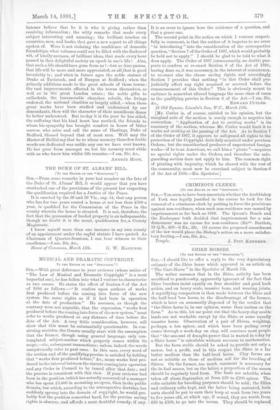MUSICAL AND DRAMATIC COPYRIGHT.
TO THE EDITOR OF THE " SPECTATOR."1
;Sin,—With great deference to your reviewer (whose notice of " The Law of Musical and Dramatic Copyright " is a most impartial one), he has fallen into what I venture to characterise as two errors. He states the effect of Section 6 of the Act -of 1886 as follows :—" It confers upon authors of works first produced before the coming into force of the new system the same rights as if it had been in operation at the date of production." He assumes, as though the contrary were not arguable, that the expression, " works first produced before the coming into force of the new system," must refer to works produced at any distance of time before the date of the Act. A very little consideration, however, will 'show that this must be substantially questionable. In con- struing statutes, the Courts usually start with the assumption that the framer, though using general language, only con- templated subject-matter which properly comes within its scope,—viz., subsequent transactions ; unless, indeed, the words unequivocally refer to past ones. In this case, every word of sthe section and of the qualifying proviso is satisfied by holding that " works first produced before," cke., mean works first pro- duced in the interval between the statute coming into operation and any Order in Council to be issued after that date ; and ithe proviso is consistent with this view. If your reviewer had -been in the position (which has actually occurred) of a manager who has spent £5,000 -in mounting an opera, then in the public domain, but which, according to the retrospective doctrine, has suddenly sprung into the domain of copyright, he would pro- bably feel the position somewhat hard, for the proviso saving rights is obscure, and affords a most doubtful remedy, if any.
It is an error to ignore here the existence of a question, and that a grave one.
The second point in the notice on which I venture respect- fully to comment, is that the author of it imputes to me error "in introducing" into the consideration of the retrospective question, " Section 7 of the Order of 1887, which would probably be held not to apply." I should be glad to be told to what it does apply. The Order of 1887 (unnecessarily, no doubt) pur- ports to confirm or re-enact Section 6 of the Act of 1886; having done so, it was necessary, in the interest of consistency, to re-enact also the clause saving rights, and accordingly Section 7 provides that nothing "in this Order shall pre- judicially affect any right acquired or accrued before the commencement of this Order." This is obviously meant to embrace in somewhat altered language the same class of cases as the qualifying proviso in Section 6, of the Act.—I am, Sir, &c., EDWARD CUTLER. 12 Old Square, Lincoln's Inn, W.C., March 11th.
[Mr. Cutler is, of course, entitled to his opinion, but the marginal note of the section is surely enough to negative his contention. " Application of Act to existing works" is its summary of the section, whereas Mr. Cutler would limit it to works not existing at the passing of the Act. As to Section 7 of the Order of 1887, it appears to safeguard all rights to the protection of the Copyright Acts duly acquired under previous Orders; but the unauthorised producer of unprotected foreign works—if he is an American, we call him a " pirate "—acquires no special rights under the Orders, and therefore the safe- guarding section does not apply to him. The common right of pirating with impunity, which he shared with the rest of the community, must now be exercised subject to Section 6 of the Act of 1886.—ED. Spectator.]


































 Previous page
Previous page